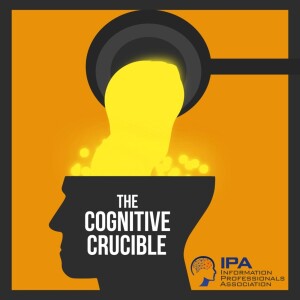
The Cognitive Crucible is a forum that presents different perspectives and emerging thought leadership related to the information environment. The opinions expressed by guests are their own, and do not necessarily reflect the views of or endorsement by the Information Professionals Association.
During this episode, Dr. Heather Gregg of the US Army War College explores how collective identity building and myths--stories designed to tell a group of people who they are, where they came from and how they should behave--shape violent conflict. Heather contrasts the way identity is used by insurgencies and counterinsurgency efforts and sketches lessons learned from recent operations against Al Qaeda and ISIS in Iraq, as well as the role that identity is playing in the Ukrainian war. Our wide-ranging conversation also covers implications of horizontal and vertical cultural transmission of information, myths as a form of storytelling, and mixing up myth and history.
Resources:
- Cognitive Crucible Podcast Episodes Mentioned
- #89 Ajit Mann and Paul Cobaugh on Narrative
- Dr. Heather Gregg’s Personal Website
- Identity wars: collective identity building in insurgency and counterinsurgency by Heather S. Gregg
- Lies My Teacher Told Me: Everything Your American History Textbook Got Wrong by James W. Loewen
- Building the Nation: Missed Opportunities in Iraq and Afghanistan Hardcover by Heather Gregg
- The Path to Salvation: From the Crusades to Jihad by Heather Gregg
- The Power of Myth by Joseph Campbell and Bill Moyers
- A Short History of Myth Paperback by Karen Armstrong
- Scott Atran, "Address to UN Security Council on Youth and Extremism." (2015)
- Vamik Volker, "The Need to Have Enemies and Allies," Political Psychology 6, no. 2 (1985): 219-247
Link to full show notes and resources
https://information-professionals.org/episode/cognitive-crucible-episode-101
Guest Bio:
Dr. Gregg’s opinions are her own & do not represent the opinions of the US Army War College or the Department of Defense
Heather S. Gregg is a professor at the U.S. Army War College’s Strategic Studies Institute (SSI). From 2006-2019, she was an associate professor at the Naval Postgraduate School’s Department of Defense Analysis, where she worked primarily with Special Operations Forces. Prior to joining NPS, she was an associate political scientist at the RAND Corporation. In addition to her academic experience, she has spent time in several regions of conflict including Palestine/West Bank and the former Yugoslavia.
Dr. Gregg earned her Ph.D. in Political Science in 2003 from the Massachusetts Institute of Technology. Her dissertation work was on historic and contemporary causes of religiously motivated violence. Dr. Gregg also holds a Master’s degree from Harvard Divinity School, where she studied Islam, and a B.A. in Cultural Anthropology from the University of California, Santa Cruz.
Dr. Gregg is the author of The Path to Salvation: Religious Violence from the Crusades to Jihad (Potomac, 2014) and Building the Nation: Missed Opportunities in Iraq & Afghanistan (University of Nebraska Press, 2018). She also has published articles and book chapters on Al Qaeda, including “Fighting the Jihad of the Pen: Countering Al Qaeda’s Ideology” (Terrorism and Political Violence, 2010) and “Crafting a Better Grand Strategy to Fight the Global War on Terror: Lessons from the Early Years of the Cold War” (Foreign Policy Analysis, 2010), in addition to co-editing and contributing to The Three Circles of War: Understanding the Dynamics of Modern War in Iraq (Potomac, 2010).
About: The Information Professionals Association (IPA) is a non-profit organization dedicated to exploring the role of information activities, such as influence and cognitive security, within the national security sector and helping to bridge the divide between operations and research. Its goal is to increase interdisciplinary collaboration between scholars and practitioners and policymakers with an interest in this domain.
For more information, please contact us at communications@information-professionals.org.
Or, connect directly with The Cognitive Crucible podcast host, John Bicknell, on LinkedIn.
Disclosure: As an Amazon Associate, 1) IPA earns from qualifying purchases, 2) IPA gets commissions for purchases made through links in this post.
More Episodes
 2023-05-16
2023-05-16
 2023-05-09
2023-05-09
 2023-05-02
2023-05-02
 2023-04-18
2023-04-18
 2023-04-11
2023-04-11
 2023-03-28
2023-03-28
 2023-03-21
2023-03-21
 2023-03-07
2023-03-07
 2023-01-24
2023-01-24
Create your
podcast in
minutes
- Full-featured podcast site
- Unlimited storage and bandwidth
- Comprehensive podcast stats
- Distribute to Apple Podcasts, Spotify, and more
- Make money with your podcast
It is Free
- Privacy Policy
- Cookie Policy
- Terms of Use
- Consent Preferences
- Copyright © 2015-2024 Podbean.com






